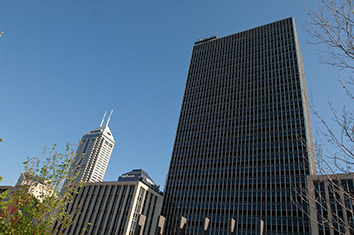Subscriber Benefit
As a subscriber you can listen to articles at work, in the car, or while you work out. Subscribe NowThe way Marion County judges are elected is unconstitutional, the 7th Circuit Court of Appeals ruled Wednesday, throwing out a system that assured an even split of Democratic and Republican judges and facilitated a pay-to-play party slating system.
“We agree with the district court that the Statute at issue burdens the right to cast a meaningful vote without sufficiently weighty interests to justify such a burden,” the 7th Circuit ruled in the case Common Cause Indiana v. Individual Members of the Indiana Election Commission.
“We conclude that the precise interests put forward by the State do not justify the burden placed on the right to vote for judicial candidates for the Marion Superior Court. Therefore, the Statute violates the First and Fourteenth Amendments,” the panel held.
Bryan Corbin, a spokesman for Indiana Attorney General Greg Zoeller, didn’t say whether the state would appeal the ruling.
“As state government’s lawyer, the attorney general’s office by law had a duty to defend the judicial election statute the Indiana Legislature passed from the lawsuit that plaintiff’s lawyers filed,” Corbin said. “We respect the 7th Circuit’s ruling and will review it with our state government clients to determine how next to proceed. It should be noted that there is no judicial election scheduled until 2018.”
Marion County’s judicial election law that ensures Democratic and Republican parties an equal number of judgeships was tossed out in October 2014 after a lawsuit was brought by the public-interest group Common Cause. The election law has facilitated a system whereby both parties “slate” those ballot positions with candidates who make five-figure financial contributions to the parties.
The slating process essentially makes the general election pointless, because those candidates who win in primary elections are assured election because of the allocation of a set number of judgeships to each party. For instance, in years where there are elections for 20 judgeships, voters receive ballots in which they may vote for up to 10 Democrats and 10 Republicans, and only 10 each are listed on the ballot.
Marion County “has a system that’s unique in the country and clearly creates a non-election,” said Ken Falk, legal director of the American Civil Liberties Union of Indiana, which represented Common Cause. “If the right to vote is going to mean anything, it means the right to a meaningful election.”
“There is no more important right in our Constitution than that of exercising a meaningful vote,” Falk said. “We are very pleased that the Court's decision forcefully reaffirms that right.”
Falk said regardless of whether the state appeals the ruling, it is time for lawmakers to act and come up with a new system for electing Indianapolis judges. “Now they have to solve this problem,” he said.
Chief Judge Richard Young of the District Court for the Southern District of Indiana, Indianapolis Division, struck down the election statute, finding it unconstitutional on its face and granting Common Cause’s motion for summary judgment.
The 7th Circuit agreed. In most cases under the Partisan Balance Statute, “So long as each candidate votes for himself or herself, as he or she presumably will, actions taken by other voters in the general election are meaningless, as they lack any opportunity to affect the outcome,” wrote Judge Theresa Springmann of the U.S. District Court for the Northern District of Indiana, sitting by designation on the panel.
The panel rejected the state’s argument that races could be contested by independent or minor-party candidates. “It does not alter the fundamental nature of the Statute – to reduce electoral choice and the availability of what would otherwise be contested elections in the interest of preserving partisan balance.” The panel held that the statute also “interferes with the marketplace” by restricting the number of candidates each party may nominate.
The system also “could be viewed as ultra-partisan,” according to the panel.
“Such a system creates the perception that a judge is chosen within the primaries, not the general election, and if a judicial candidate’s eventual election is dependent solely on the primary, the candidate’s chances of being elected improve the more he appears to espouse the ideals of the party,” Springmann wrote.
And because judicial candidates are “slated” by parties after making contributions of about $12,000 to $14,000 to the local parties, “the candidate could consider himself indebted to the party. His best chance at winning the election is to earn a spot on the party’s slate of preferred candidates,” Springmann wrote.
The panel also rejected the state’s argument that partisan balance was crucial because about 20 percent of court filings statewide are made in Marion Superior Court, including petitions for judicial review of state agency actions that may have a statewide impact.
“We do not see why the fact that the Marion Superior Court ultimately decides a relatively significant percentage of the State’s annual cases, including cases with a statewide impact, necessitates a unique electoral system ensuring partisan balance,” the panel held.
“If the state decides that a partisan judicial election is the best-suited system for filling judicial vacancies in a particular jurisdiction, as it of course may, voters must have the opportunity to cast a meaningful vote in that election,” Springmann wrote.
Please enable JavaScript to view this content.

